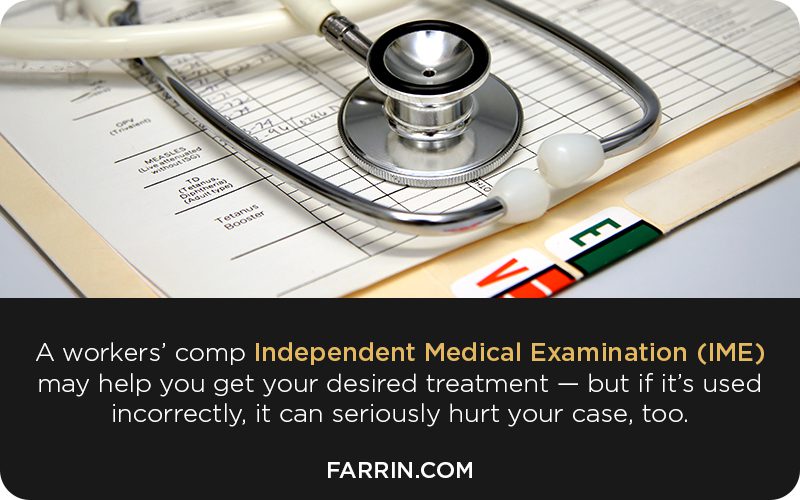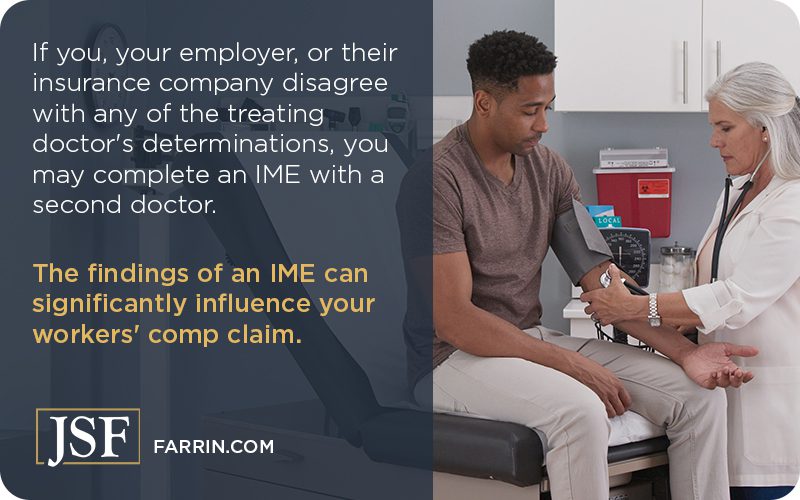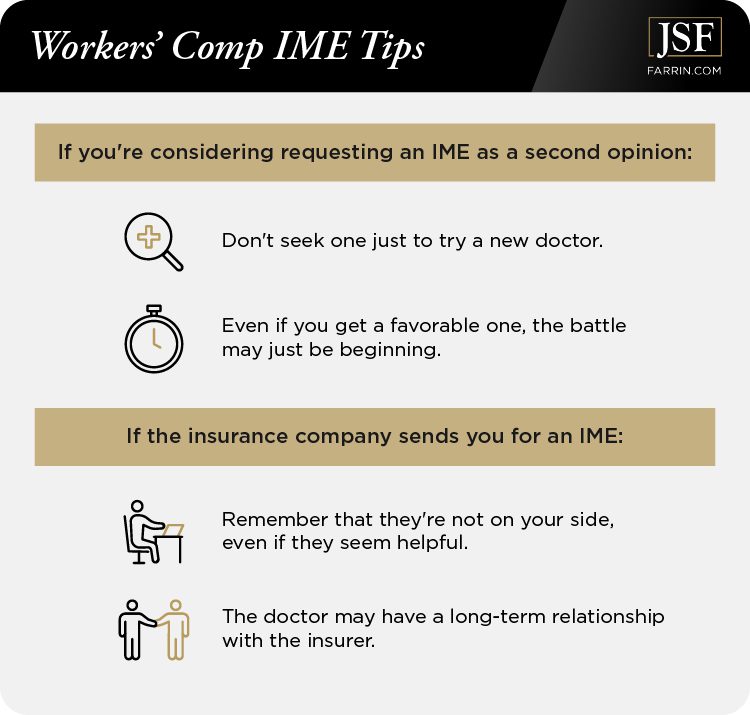If you’ve been injured at work, you’re likely in a lot of pain and dealing with a lot of stress.
A successful workers’ compensation claim means much needed medical benefits to help you heal, but there’s a catch. Your employer’s insurance company decides which doctor you see, and they’ll decide what medical treatment you should receive. So, what do you do if you feel their physician isn’t providing adequate care and helping you recover well enough?
A workers’ comp Independent Medical Examination (IME) may help you get your desired treatment – but if it’s used incorrectly, it can seriously hurt your case, too.
Sometimes, the insurance company disagrees with its chosen doctor about your injury and necessary treatment, in which case they may initiate your workers’ comp IME (in the hopes of getting a result more favorable to them). You can’t refuse the insurer’s request for an IME, but you do have rights.
In this article, I’ll discuss what IMEs are, how they work, when you might want one, when you might not, pitfalls to avoid, and how a workers’ compensation attorney can significantly increase your odds of success for your workers’ comp claim.
Independent Medical Examination (IME) Overview
In workers’ compensation, an IME can occur at the request of the employer, their workers’ compensation insurance company, or you, the injured worker. Here’s the process:
After you’ve been injured, if you’ve successfully applied for workers’ comp benefits, you’ll be sent to a treating doctor chosen by your employer’s insurance company. This doctor will diagnose your injury and create a treatment plan for you. The doctor will then determine when you’ve reached Maximum Medical Improvement (MMI) and decide what, if any, permanent disability and work restrictions you may have.
Your treatment plan, when you reach MMI, and possible permanent disabilities and restrictions are all important factors in the compensation you may receive for your workers’ comp claim.
If you, your employer, or their insurance company disagree with any of the treating doctor’s determinations, you may complete an IME with a second doctor. The findings of an IME can significantly influence your workers’ comp claim.
Remember, you must attend an IME if the insurance company wants to send you for one.
The IME doctor could be a specialist with knowledge and expertise that the treating physician might not possess, or they could be another physician whose job is to review and verify the findings of the first one. Either way, your employer’s workers’ compensation insurance company will choose who you see.
Trying to Make Your IME Happen
If you want an IME because you disagree with the treating doctor, you must request a second opinion from the insurance company, which may ignore or try to deny your request. However, in both North Carolina and South Carolina, the insurance company almost always grants the request. Note that if the insurance company chooses to send you to an IME, this does not count as your second opinion – you can still request your own.
If the insurance company does not grant your request for a second opinion, you can appeal to the agency that oversees workers’ compensation in your state. In N.C., that’s the North Carolina Industrial Commission and in S.C., it’s the South Carolina Workers’ Compensation Commission.
In some states, it may be possible for you to pay out of pocket to receive an IME from a doctor you choose, but the circumstances vary. In North Carolina and South Carolina, you may seek an independent IME, but the insurance company won’t pay for it, and you’ll have to fight for coverage for any additional treatment it recommends.
We advise being cautious about seeking an independent IME with a doctor you pay for, as you could risk harming your case. An experienced workers’ compensation attorney can guide you and answer your questions each step of the way.
The Strategy of Independent Medical Exams in Workers’ Compensation
Whether you pursue an IME because you’re dissatisfied with your treating doctor’s opinions, or because the insurance carrier makes you go to one, there are strategic considerations you need to be aware of.
If you’re the one pursuing the IME as a second opinion, here are two critical tips:
- Don’t be impatient. Don’t pursue an IME just to see if the new doctor can help you recover more quickly. It’s possible that an IME doctor will simply agree with the first doctor – or even make a less favorable determination.
- A favorable IME may just be the beginning. If your IME doctor makes different determinations about your injury than the first doctor, that doesn’t necessarily mean the insurance company will accept it. You and your attorney may have to fight hard for it. Your attorney can even take your case to court if needed.
If you’re sent to an IME by the insurance company, here are two critical tips:
- The insurance company is not on your side. They, like your employer, are protecting their own interests. Most insurers are for profit, which means they make more if they pay you less. At no time during the process should you assume you’ll be taken care of, even if the insurance company appears cooperative. Don’t expect the insurance company to hurt their case to help you, even if you believe it’s the right thing to do.
- Your doctor is only human. The doctor the insurance company sends you to may have a long-term relationship with them. You may not get a favorable result.
And if you do get a favorable IME, the insurance company may try to downplay it – even if they’re the ones who sent you to get the IME in the first place.
I once helped someone who had developed severe injuries in both his hips. The insurance company’s own doctor said my client needed major surgery. Yet the insurance company delayed. Finally, they said they wanted this injured worker to get an IME.
The IME doctor downplayed the injuries, saying surgery wasn’t necessary. Finally having enough, the worker contacted me and became my client. The insurance carrier realized my client now had legal representation, and they reversed course and authorized the surgery.1
How an IME Works – And What Pitfalls to Avoid
The IME process typically involves the following steps:
- Request – Either you or your employer’s insurance company can request an IME based on the findings of the first treating doctor. If you want to pursue an IME, don’t act too soon. An attorney can help you determine the best time for you to request an IME or fight on your behalf if the insurance company denies your request.
- Notification and Scheduling – Following an approved IME request, the insurance company will determine which IME doctor it wishes to send you to. They’ll likely choose a doctor they have a long-term relationship with, but if you’re not comfortable with that doctor, an attorney may be able to help you identify one you are comfortable with.
- Examination – You’ll meet with the IME doctor, who’ll be familiar with your medical history and what treatment you’ve received. The doctor will perform a physical exam and may order other diagnostic tests and ask high-stakes questions about your prior treatments.Your attorney can help you prepare for how you should engage with the IME doctor during the examination. In general, you should answer the doctor’s questions truthfully.
- Report –The IME doctor will prepare a report of their findings and distribute it to all relevant parties. Some insurance companies may try to leverage a report favorable to them while completely downplaying and ignoring an unfavorable report. Your attorney is on your side and helps you level the playing field.
Procedural Differences in IMEs Between North Carolina and South Carolina
Between North Carolina and South Carolina, a major difference exists in the process when there’s a dispute over the findings of the treating physician.
North Carolina allows you to file motions, which can be a relatively fast and convenient way to resolve disputes. South Carolina requires disputes to be settled using hearings, which means the physical presence of attorneys for both sides in front of the South Carolina Workers’ Compensation Commission. Fortunately, disputes regarding IMEs are usually worked out between parties informally to avoid the necessity of a hearing.
Get a Free Case Evaluation With James Scott Farrin
An experienced workers’ comp attorney can help with your IME whether you or the insurance company initiate it. Your attorney may be able to help with:
- Case Speed – Some insurance companies may delay in the hopes of getting you to accept a lowball offer. An attorney can give you leverage to try to hold the adjuster accountable and can pursue a quick resolution to any disputes in your case.
- Leveling the Playing Field – If the insurance company tries to dismiss an IME that’s favorable to you, your attorney fights for you to get the treatment you want to help you recover – and all the compensation you may deserve.
My firm was named to the 2024 edition of U.S. News – Best Lawyers’ “Best Law Firms” list, with a Tier 1 ranking (the highest) for workers’ compensation law.4 And several of our attorneys used to work for the “other side,” so we know how to counter insurance company tactics and fight for maximum compensation.
For a free case evaluation with no obligation, contact us online or call 1-866-900-7078 today.







